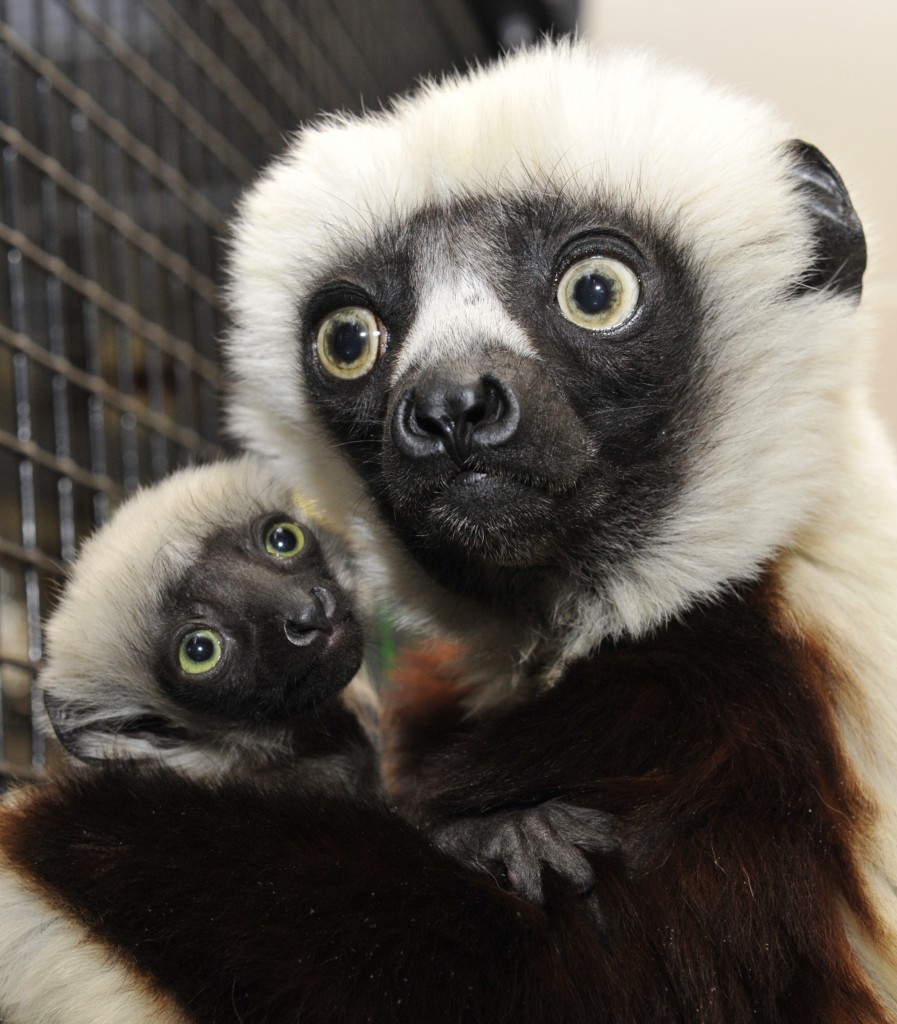 December 30, 2014 — 2014, the biggest year ever!
December 30, 2014 — 2014, the biggest year ever!
Two-thousand-fourteen was definitely the Year of the Lemur, and the Duke Lemur Center was in the middle of it all. We launched a new website at the beginning of the year, just in time for IMAX’s Island of Lemurs: Madagascar. We released nearly 50 years of lemur data to the public. Sadly, along with millions around the world, we bid farewell to Jovian also known as Zoboomafoo from the children’s TV show by that name.
Here we present some of the highlights from across the Duke Lemur Center in Durham and in Madagascar for 2014.
A lemur star passes
 The top story of the year is also the saddest. Jovian, star of the children’s show Zoboomafoo passed at age 20.5 years on November 10. News of his passing spread, and sympathy and support from around the world poured in on social media pages, emails and letters. Millions of people took to the Internet to express their condolences and a sense of loss of a well-loved childhood friend. The Lemur Center’s website crashed from the amount of traffic of folks attempting to find the obituary. Jovian was a special lemur, and we continue to miss him dearly. But, we are ever hopeful as we await the birth of a grandchild!
The top story of the year is also the saddest. Jovian, star of the children’s show Zoboomafoo passed at age 20.5 years on November 10. News of his passing spread, and sympathy and support from around the world poured in on social media pages, emails and letters. Millions of people took to the Internet to express their condolences and a sense of loss of a well-loved childhood friend. The Lemur Center’s website crashed from the amount of traffic of folks attempting to find the obituary. Jovian was a special lemur, and we continue to miss him dearly. But, we are ever hopeful as we await the birth of a grandchild!
All-you-can-download lemur data
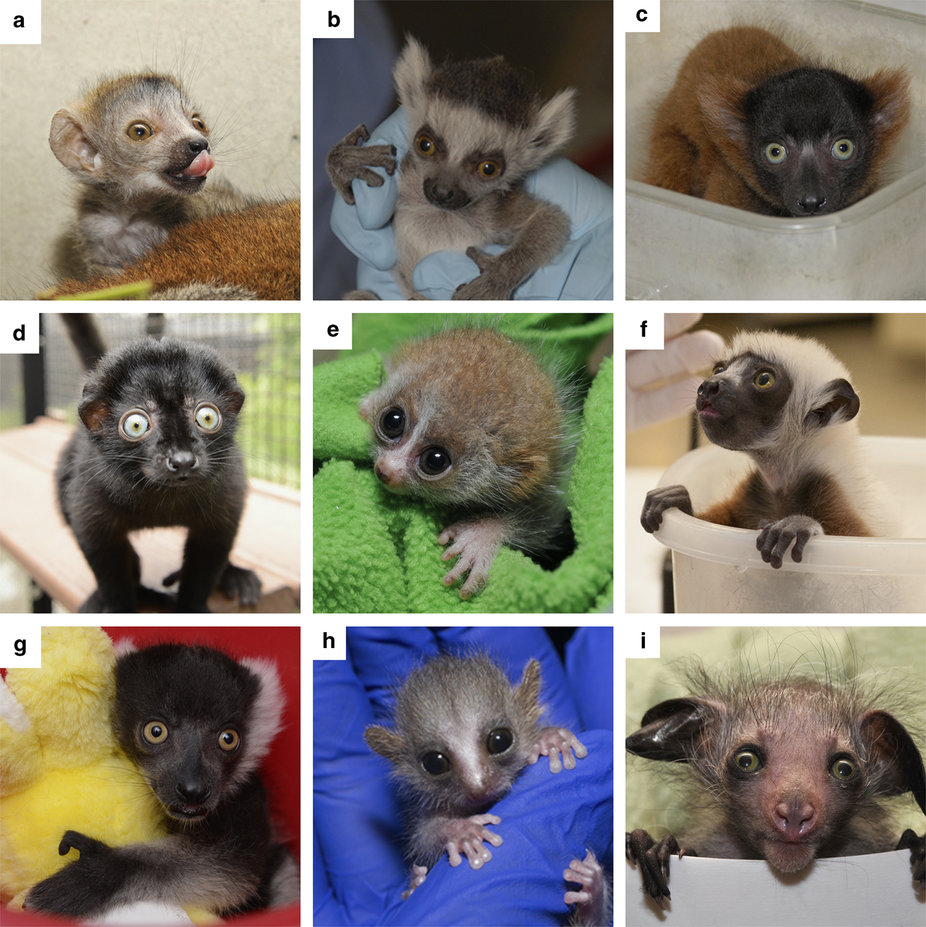 In the world of lemur science, the Lemur Center made headlines by releasing nearly 50 years of life history data online for free. Data Manager Dr. Sarah Zehr, along with support from two software engineers, Freda Cameron and the late Richard Roach, constructed a database of lemur data beginning with paper records from the 1960s. The database is available for download, and we hope that scientists, students and teachers will find the data useful in research projects or classroom instruction. The Lemur Center also won the unofficial title of Best Research Paper Figure Ever.
In the world of lemur science, the Lemur Center made headlines by releasing nearly 50 years of life history data online for free. Data Manager Dr. Sarah Zehr, along with support from two software engineers, Freda Cameron and the late Richard Roach, constructed a database of lemur data beginning with paper records from the 1960s. The database is available for download, and we hope that scientists, students and teachers will find the data useful in research projects or classroom instruction. The Lemur Center also won the unofficial title of Best Research Paper Figure Ever.
Lemurs go to Hollywood
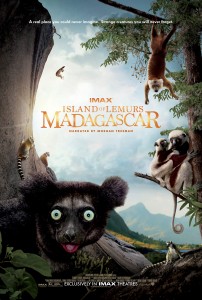 IMAX and Warner Brothers caught lemur fever this year with the release of Island of Lemurs: Madagascar. Lemurs hit the silver screen in a big way with Morgan Freeman narrating an incredible documentary on lemurs and the fight to save them in Madagascar. IMAX crews visited the Duke Lemur Center to shoot the opening of the movie, which opened in IMAX theaters April 4. Our tiny fat-tailed dwarf lemurs reprised the role of ancestral primates sailing on a raft to Madagascar, while the oh-so-smart ring-tailed lemur Licinius played computer games for the camera. The 40-minute documentary was visually stunning, with sweeping panoramas of rain forest alongside the devastation of slash-and-burn agriculture.
IMAX and Warner Brothers caught lemur fever this year with the release of Island of Lemurs: Madagascar. Lemurs hit the silver screen in a big way with Morgan Freeman narrating an incredible documentary on lemurs and the fight to save them in Madagascar. IMAX crews visited the Duke Lemur Center to shoot the opening of the movie, which opened in IMAX theaters April 4. Our tiny fat-tailed dwarf lemurs reprised the role of ancestral primates sailing on a raft to Madagascar, while the oh-so-smart ring-tailed lemur Licinius played computer games for the camera. The 40-minute documentary was visually stunning, with sweeping panoramas of rain forest alongside the devastation of slash-and-burn agriculture.
#LemurWeek
 The weeklong party leading up to the release of the IMAX film – Lemur Week – was an enormous success! Local businesses in the Triangle partnered with the DLC to host a scavenger hunt, and Fullsteam Brewery in Durham created a special brew to celebrate lemurs. Maky the DLC mascot popped up all over the Triangle to promote lemur science and conservation and the IMAX film. In addition to our local Lemur Week, the Groupe d’Etude et de Recherche sur les Primates de Madagascar hosted the first ever World Lemur Festival. Special events in Madagascar and around the world brought attention to the plight of lemurs in the wild.
The weeklong party leading up to the release of the IMAX film – Lemur Week – was an enormous success! Local businesses in the Triangle partnered with the DLC to host a scavenger hunt, and Fullsteam Brewery in Durham created a special brew to celebrate lemurs. Maky the DLC mascot popped up all over the Triangle to promote lemur science and conservation and the IMAX film. In addition to our local Lemur Week, the Groupe d’Etude et de Recherche sur les Primates de Madagascar hosted the first ever World Lemur Festival. Special events in Madagascar and around the world brought attention to the plight of lemurs in the wild.
Raising awareness, saving biodiversity
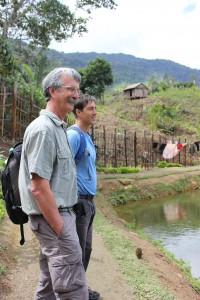 In Madagascar, the DLC-SAVA Conservation initiative expanded many programs and raised awareness. Professional development for Malagasy teachers to help incorporate environmental issues into lesson plans grew. Programs designed to support community development also grew and saw important first milestones, hopefully the first steps toward a sustainable future in Madagascar: Some of the highlights of conservation included:
In Madagascar, the DLC-SAVA Conservation initiative expanded many programs and raised awareness. Professional development for Malagasy teachers to help incorporate environmental issues into lesson plans grew. Programs designed to support community development also grew and saw important first milestones, hopefully the first steps toward a sustainable future in Madagascar: Some of the highlights of conservation included:
- Teacher trainings continued, with an additional 400+ primary school teachers and educators trained in use of the teacher’s manual for teaching environmental education.
- More village Paratilapia fish farming ponds were constructed and stocked with fish, and more fish were harvested from the first demonstration pond at Ambodivohitra.
- The first yam harvest was carried out at Ambodivohitra, producing 1,650 lbs of yams. Yams are being promoted as a more sustainable alternative crop.
- The first arrival of ADES fuel efficient stoves were quickly sold out, with more to come. DLC-SC is seeking to make the minimum fuel use stoves readily available to the people of the SAVA region.
- The private reserve of Antanetiambo expanded through land purchases by project collaborator and reserve owner, Desiré Rabary. And infrastructure improvements (toilet, shower, water well) were put in place in nearby Matsobe, for visiting researchers and students.
- DLC-SC received a significant 3 year support grant from the Leona M. and Harry B. Helmsley Charitable Trust.
- With funding from Virgin Unite and the Anlyan family, a project vehicle, a Toyota Hi-lux pick-up, was purchased.
- Project director Erik Patel attended the International Primatological Society meetings in Viet Nam. Erik co-organized a special symposium on lemur conservation in Madagascar, and also gave a presentation on the DLC’s SAVA Conservation project.
- DLC-SC hosted two Duke University ENGAGE volunteers/ DLC student tour guides for two months in SAVA.
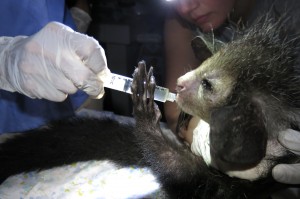 With support from the San Diego Zoo and the Madagascar Flora and Fauna Group, DLC sent a vet and lemur keeper to Madagascar to give emergency medical care to 5 rescued aye-ayes.
With support from the San Diego Zoo and the Madagascar Flora and Fauna Group, DLC sent a vet and lemur keeper to Madagascar to give emergency medical care to 5 rescued aye-ayes.
As you can see, 2014 was definitely a HUGE year for lemurs! Looking forward to the New Year, the Duke Lemur Center is making plans for another year of growth. We are already expanding summer camps for more age groups and adding an extra session, increasing capacity for tour visitors in Durham and trips to Madagascar (the Madagascar trip is already full), growing partnerships within Duke University and beyond into the local Durham community (look for Maky the mascot at Duke Athletic events), and continuing to build on our programs to support communities, education, sustainable development, and endangered species protection in Madagascar.
Thank you!
To everyone that visited the Lemur Center, came out for Lemurpalooza, or tracked lemurs across town for Lemur Week,
To everyone who volunteered their time and their ideas – our volunteers and collaborators on-campus and off – and to everyone who supported the Lemur Center with a financial gift,
And to everyone else who follows along because you like lemurs,
All of these high points of 2014, and many more not listed here, were made possible from your generous support. The Duke Lemur Center continues to push the frontier of science and conservation because we have support from you.
We hope you will continue your support in 2015! You can find ways to contribute or make a tax-deductible, year-end gift by visiting https://lemur.duke.edu/protect/donate.
We wish you a happy holiday season and our best wishes for the New Year!
 Chris Smith has been at the Lemur Center since 2009 as student, volunteer, keeper and now serves as education specialist. He completed a Masters in Environmental Management from Duke University in 2011 and has been interpreting wild animals and wild places for 7 years.
Chris Smith has been at the Lemur Center since 2009 as student, volunteer, keeper and now serves as education specialist. He completed a Masters in Environmental Management from Duke University in 2011 and has been interpreting wild animals and wild places for 7 years.

